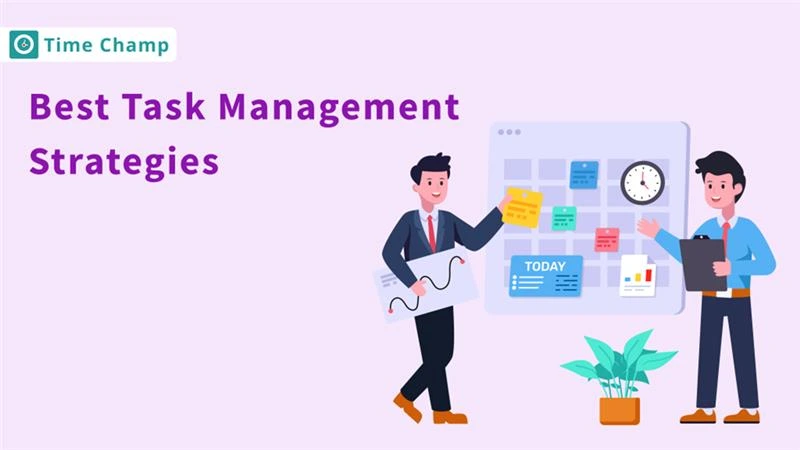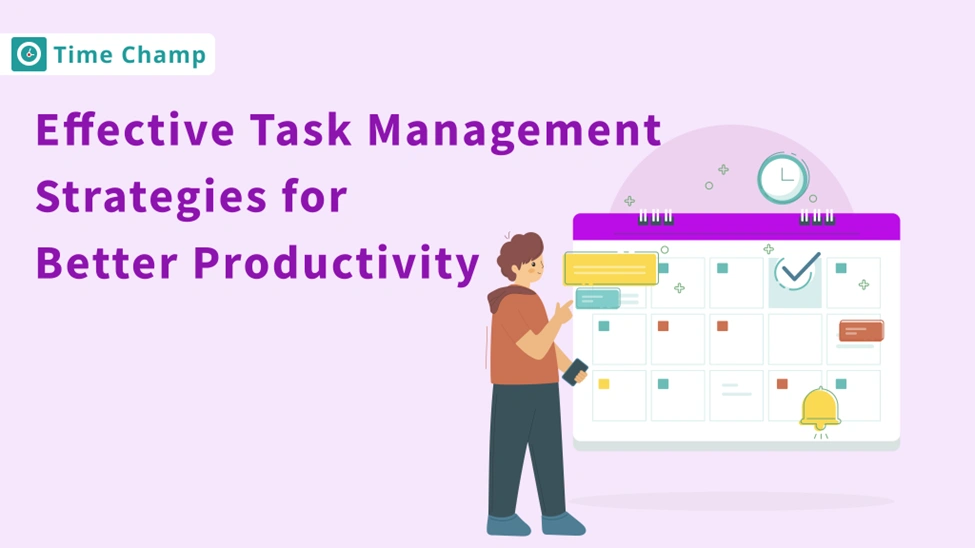Have you ever felt stressed because of poor task management? By using effective task management strategies, you can stay organized and boost team’s productivity. What goes into it is planning your tasks, establishing specific deadlines, and dividing large assignments into small portions. Good task management helps you to be productive, stress-free, and makes sure that the important tasks are attained on time.
Here, I will explain to you how to use task management to monitor tasks, benefits, get friendly reminders, and remain informed about important dates.
What Is Task Management?
Task management helps in planning, monitoring, and controlling individual tasks or group activities to achieve specific goals. It helps you break down larger projects into smaller, manageable steps, assign responsibilities, set deadlines, and track progress. Effective task management improves productivity, reduces stress, and ensures that important work is completed on schedule. Task management also involves tracking progress, using resources wisely, and handling challenges effectively
The Importance of Task Management
Good task management helps your team members to stay organized and on course as it ensures focus remains on your important tasks. Planning and prioritizing your tasks prepares your brain to remember everything important and avoids stress.
Taking effective task management will ensure that you manage your time better and achieve more with less interventions. Dividing tough goals into small acts will help you achieve them better and on time.
Finally, it will be helpful for you when you feel the ability to manage strong tasks that will help you to pass the challenging moments of your life and move closer to achieving the goals.
Common Task Management Challenges
Task management is not always simple. Most individuals encounter issues that can delay their work or complicate their organization. Ineffective planning, distractions, or the absence of clear priorities can cause tasks to accumulate rapidly. Understanding these common problems can assist you in discovering improved methods of managing your tasks.
- Balancing numerous tasks simultaneously could take your attention off from focusing on the task.
- Delaying things may lead to stress and a stressful finish.
- Lack of determination of priorities can result in wastage of your time.
- Being interrupted and distracted from your focus can cause you to slow down and fall behind.
- There are many chances to overlook important deadlines if you don't plan your activities well.
Best Task Management Strategies to Boost Your Efficiency

Effective task management allows employees to handle their workload more efficiently and with less stress. By using the right strategies, you can stay focused, organized, and complete the tasks faster. These simple task management techniques can make you more productive at work every day.
1. Tackle the Most Important Task First
Start your day by working on the task which demands your immediate attention or highest priority. In this manner, you take advantage of your clean mind and focus on the most important jobs.
Getting your major things done early in the day gives you confidence and enables you to keep momentum.
2. Set Time Blocks for Deep Work
Schedule particular time slots in your day to deal with only priority tasks without distractions.
During this period, switch off notifications and inform others that you are not available. This prevents you from falling out of flow and accomplishing high-quality work more quickly.
3. Create an Idea Repository
Make a record of any concepts that pop up during your daily activities, it’s in a custom notebook that motivates you, a tracking app, or just white plain paper.
It clears your mind and gives you a chance to return to them later, when you are able to act on them. It can also be utilized optimally in brainstorming new concepts and planning your timetable.

4. Break Down Large Tasks
Large tasks can be stressful if you attempt to do them all at once. Dividing them into little, doable steps makes it simpler to begin. Doing individual tasks will help you know how you have improved and will keep you motivated.
5. Batch Similar Tasks
Group tasks that are similar, like checking emails, making calls, or filing documents, and do them in one go. This can reduce time lost switching between different types of work. Your mind stays focused, and you can complete tasks more efficiently.

6. Master Your Day with Time Capsuling
Encouraging Time Capsuling can help employees increase productivity. It means breaking down the workday into sections, each dedicated to only one task.
Using this method limits the amount you switch tasks and helps you stay focused which leads to better work. For Example, plan your capsules at the start of the day (e.g., 9:00–10:00 AM: Emails, 10:00–11:30 AM: Deep work). When employees encourage time capsuling, they can handle their work better and avoid becoming overworked.
7. Review Tasks Regularly
Spend few minutes once a day or week and look at your schedule of tasks. In doing so, you can stay organized and see important deadlines ahead, and when something changes, adjust your schedule accordingly.
8. Share the Workload
Work balance is the secret to making your team efficient, yet not stressful. Distributing the work evenly among all the team members precludes exhaustion and helps maintain motivation by ensuring no one feels overburdened. It allows the team to stay within schedules and consistently deliver results. Having tasks split evenly according to individual’s strengths creates improved output and a better, more collaborative work environment.
9. Incorporate Short Breaks
Adding short breaks to the working day is an easy but effective method of staying focused and energized. Extended working without a break causes mental fatigue and stress. Taking hourly 5-10 minutes breaks would allow your mind to rest and reset. These micro pauses can increase productivity, minimize burnout, enhance overall wellbeing, and keep you always fresh and active.
10. Use a Task Management Tool
A task management tool is a function that enables you to organize tasks, distribute responsibility, and review achievements in one environment. Not even tools such as Trello, Asana, or Click Up will make it hard to know who’s doing what and when it’s due.
This eliminates confusion, eliminates redundancy at work, and makes you accountable. Using a task management tool, teams can operate more efficiently, keep to deadlines, and be on the same page with regard to common goals.
How Time Champ Helps You Manage Tasks Easily
Smart task management is the first step to up your productivity, and task management in Time Champ will help you with that. Whether it is time to work on your own or with others, this feature will offer you to stay organized, focused and on target without ever feeling overwhelmed.
- Time Champ’s task management feature helps you stay consistent by allowing you to set up recurring tasks and reminders with ease.
- With smart alerts and progress tracking, Time Champ ensures you never miss a deadline.
- Real-time updates in Time Champ keep you informed about tasks, projects, and team activities as they happen.
- Time Champ organizes your work based on urgency and deadlines, helping you focus on high-priority tasks first.
- It sends gentle reminders throughout the day so you stay on track and meet your goals.
- With the use of subtasks, tags, and filters, Time Champ keeps your entire task list organized and easy to manage.
- You can break large goals into smaller tasks and watch your progress grow over time, all within Time Champ.
Conclusion
Effective Task Management Strategies are great in helping you to stay organized, manage stress, and increase productivity. Using simple techniques like prioritizing tasks, dividing big goals, and having short breaks, you can use your time more effectively and remain focused during the day.
With Time Champ, task management becomes even simpler. Using it, you can plan, track, and accomplish tasks with minimum effort. Whether you are alone or in a team, these strategies will keep you updated on your work, meet deadlines, and continuously move forward to your goals.
Frequently Asked Questions
The strategy that works best for you depends on your work style and objectives as well as your daily routine. Experiment with the approaches, two-minute rule, time blocking, or utilizing a task management tool to find out what will keep you focused and organized. Pay attention to what makes your day go by more smoothly and allows you to complete tasks within the deadline.
Yes, task management strategies have an important role in decreasing burnout. Burnout will come in mainly if you are overwhelmed, very busy and you do not get time to rest. By employing smart strategies like prioritizing important tasks, setting deadlines and scheduling small breaks, you make your workflow healthier.
Not at all. Even if task management software is just wonderful for a team, it is also quite useful for an individual. They put you on the right path by making you stay up to speed on deadlines and help you plan day-to-day tasks. If you are doing things on your own or with others, it is wise to utilize software that will make work well-organized, systematic, and easy to keep track of.
Task management and time management are interconnected in a certain way, but they have different goals.
Task management means what you need to do. It involves making a list of tasks, prioritizing, dividing big projects into smaller steps, and marking progress. Time management is concerned with when and how long you take to complete those tasks. It is about making the best use of your time available so that you don’t run behind schedule with the feeling of being in a hurry.
Sometimes it is okay to rearrange tasks, sometimes things don’t go the way they’re planned. Yet, when you continue to procrastinate on the duties, this may indicate that you do not plan properly or procrastinate. Try to check your tasks frequently, set deadlines that you can adhere to, and avoid taking too much time. Adjusting your schedule should be something that you should do once in a while, not all the time.








